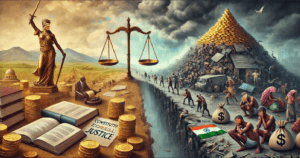Uniform Civil Code: A Distraction from Economic Justice?
The debate over India’s Uniform Civil Code (UCC) has sparked divided opinions, with concerns that it distracts from urgent economic issues. Article 39 of the Constitution emphasizes economic justice, yet wealth remains highly concentrated, with the top 1% owning over 50% of the nation’s wealth. The poorest 50% bear a disproportionate tax burden, while essential sectors like healthcare and education remain underfunded. Uttarakhand, the first state to implement the UCC, faces high unemployment and environmental crises, yet prioritizes legal reforms over economic development.
The law’s regulation of live-in relationships raises concerns over personal freedom and privacy. Religious minorities, particularly Muslims, see the UCC as a threat to personal laws and religious freedom. The All India Muslim Personal Law Board plans to challenge it in court. Critics argue that economic justice should take precedence over legal uniformity. A 2024 Time report highlights worsening income inequality, calling for poverty reduction and wealth redistribution. Without addressing unemployment and access to basic services, the UCC risks widening social divides. True equality requires economic reforms, not just legal changes.

Uniform Civil Code: A Distraction from Economic Justice?
The discussion surrounding the Uniform Civil Code (UCC) in India has generated strong opinions from different perspectives. While some view it as a move toward legal equality, others argue that it is not the most pressing issue, especially given the country’s ongoing economic challenges and widening inequality.
The Indian Constitution’s Article 39 emphasizes economic justice, which calls for the fair distribution of wealth and resources. However, despite India’s rapid economic growth, wealth remains concentrated in the hands of a few. The richest 1% of the population controls over half of the nation’s wealth, while the bottom 50% collectively own just 4.1%. Additionally, the poorest segments of society bear the highest tax burden, contributing 64% of total GST revenue. Instead of addressing critical issues such as poverty reduction, healthcare improvements, and education expansion, the government has placed greater emphasis on legal reforms like the UCC. This has led to concerns that such measures are shifting attention away from urgent economic challenges affecting millions.
Uttarakhand recently became the first Indian state to implement the UCC, but the state continues to face major economic problems, including high unemployment and severe environmental issues such as deforestation and frequent landslides. Rather than prioritizing economic development, the focus has been on personal law reforms, raising concerns about misplaced government priorities. One particularly controversial provision of Uttarakhand’s UCC is the requirement for live-in couples to register their relationship with the authorities, with legal penalties for non-compliance. Critics argue that this infringes on personal freedoms and may be misused to unfairly target individuals.
Religious minorities, particularly Muslims, see the UCC as a threat to their personal laws governing marriage, divorce, and inheritance. Organizations like the All India Muslim Personal Law Board (AIMPLB) have strongly opposed it, arguing that it undermines their constitutional right to religious freedom under Article 25. Many believe the UCC favors the majority population rather than ensuring fair and inclusive legal reform, which has led to legal challenges against its implementation.
While the UCC seeks to establish legal uniformity, economic justice should be the priority. A 2024 Time report highlighted that income inequality in India has reached levels worse than those seen during British rule. If the government is serious about creating a more equal society, it must focus on eradicating poverty, generating employment, and ensuring fair wealth distribution before enforcing legal uniformity.
Ultimately, laws alone cannot address deep-rooted economic disparities. Without tackling issues such as unemployment, rising living costs, and limited access to essential services like healthcare and education, the UCC could further widen the gap between privileged and marginalized communities. True justice lies not in enforcing a uniform legal system across diverse populations but in ensuring equal economic opportunities and access to basic needs. Until these core issues are resolved, the UCC may serve more as a distraction from urgent socio-economic concerns rather than a meaningful step toward justice and equality.
You must be logged in to post a comment.